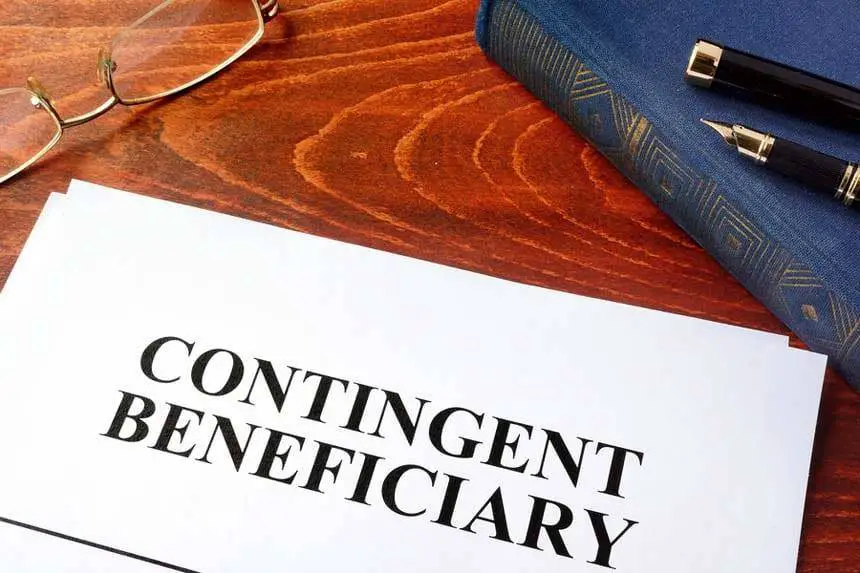
The term contingent beneficiary is related to life insurance. When you get life insurance for yourself, you are asked to mention two beneficiaries. Well, if you are new to these terms it is pretty natural. In this article, I will help you understand everything about a contingent beneficiary. So, let’s begin with a very basic understanding of insurance.
Life Insurance | Contingent Beneficiary

Most of us probably have life insurance or think about getting one. Life insurance is nothing but a contract or an agreement between a person and a company. The company that renders the insurance assures the person of paying a sum of capital following the demise of the insured person after a certain fixed period of time.
The sum of money that a beneficiary avails is not just in case of death but also in other situations according to the contract built. In many cases, depending on the contract, the beneficiary can also avail the amount in situations like terminal or critical illness. For the beneficiary to avail of this, he or she pays a premium either monthly or annually.
The life insurance contract certainly covers all the costs that may come up in case of the holder’s death. Expenses of a funeral can also be included in the insurance contract. The entire contract has its own terms and conditions depending on the policies of the respective insurance companies. Different companies have their own terms and conditions or policies they follow.
We all are certainly aware of the fact that not to sign any papers without reading them. When it comes to insurance policies, it is apparent that we give it a read before we go ahead and make a deal. Like any other policy or account, when you go to get insurance, the first thing a company hands you is an application form.
In the application form, we all come across many terms that we don’t understand. One of the most common things you will come across is primary and contingent beneficiary. Not every one of us understands this kind of technical terminology. However, even though these words sound baffling, they have a very simple meaning.
Now, let’s move forward with the details!
What Is A Beneficiary?

A life insurance policy is all about the beneficiary who will get the benefit of a sum following the death of the policyholder. In general, a beneficiary is a person who is benefitted from a certain event or situation. Well, I don’t want to say that someone’s death is a benefit for the other but to explain what beneficiary means I had to state it.
Coming back to life insurance, a beneficiary is the one who gets financial assistance from the insurance company in case of emergencies. In a life insurance policy, a holder can nominate two beneficiaries; primary beneficiary and contingent beneficiary. Depending on the insurance company, one can even nominate more than two beneficiaries.
Having more than one beneficiary is not a big deal, all you have to do is decide what percentage of the policy goes to which beneficiary. As a holder, you pay a primary every month or every year, depending on that agreement amount, you have to decide which of your beneficiaries gets what percentage of the benefit amount.
According to different companies, they have a different number of beneficiaries that are allowed for your insurance. The basic thing is that the division of the percentage is such that the total of percentages for respective beneficiaries sums up to 100% of your policy amount.
What Does A Contingent Beneficiary Mean?

Now, as you know there are two types of beneficiaries; primary and contingent beneficiaries. The contingent beneficiary is more like a backup of the primary beneficiary and is also called a secondary beneficiary. The holder of the insurance policy can nominate one or more people as a contingent beneficiary.
A contingent beneficiary receives benefits if the primary beneficiary is deceased or not located. As mentioned earlier, a contingent beneficiary is pretty much a backup for your primary beneficiary. Needless to say, the contingent beneficiary can avail of the benefits only under specified conditions by the insurance company.
There may be events where the contingent beneficiary is minor or underage. In such cases, there shall be a guardian who may assist the minor with overseeing the assets up until the minor reaches a self-handling legal age.
How Is Contingent Beneficiary Different From Primary Beneficiary?
Primary Beneficiary
A primary beneficiary is a very first nominee who will avail the sum amount from your policy. Even in the case of a primary beneficiary, there can be more than one or two of them. Again, you just have to decide which beneficiary gets what per cent of policy amount they are benefited with.
Generally, a primary beneficiary is a spouse, child, or parents, basically, the first family of the holder. So, a primary beneficiary is the one who initially gets the benefits of the policy amount in case of your death. Primary beneficiaries are evidently unaffected by the contingent beneficiaries. In short, their inheritance has zero decrements or effect upon naming or adding a contingent beneficiary.
Contingent Beneficiary
The contingent beneficiary on the other hand is the one who is next in line after the primary beneficiary to avail of the benefits of the policy amount. They can inherit any benefits only in case if something happens to the primary beneficiary or he/she is unavailable.
The inheritance of the contingent beneficiary totally depends upon the primary beneficiary. These beneficiaries are an assurance that in case something happens to the primary beneficiary, your assets will be available to someone you know.
Why Is A Contingent Beneficiary Important?

A contingent beneficiary is a way that helps prevent any unnecessary wastage of time and expenses regarding the probate. When there is no will of a deceased person, probate is a way of distributing the assets. It helps to assure that the assets are going in trusted or known hands.
For instance, say Michael is the holder of an insurance policy. He has nominated his son as a primary beneficiary and his granddaughter as the contingent beneficiary. Due to some undesirable circumstances, if something happens to Michael’s son, all his assets will go to his granddaughter.
When you have a designated backup for your primary beneficiary, in their absence, the estate taxes and the things that come along with it can be avoided. There can be certain specified qualifications that need to be met if the contingent beneficiary is to avail the assets of the policy.
In case if there is no contingent beneficiary and your primary beneficiary is deceased or unavailable, the insurance company pays the lump sum to your estate. Following that, the decision of who will get the assets lies in the hands of the judge. This legal process may take a really long time depending on the complexity of the matter.
Attributes Of A Contingent Beneficiary
For nominating a contingent beneficiary, the person shall be eligible for the same. The following are the attributes of a contingent beneficiary.
- It can be a person, charity, organization, estate, or even a trust.
- A minor or a pet is not eligible for the beneficiary as they do not possess the legal power or rights to accept or own the assets of the policy.
- In case there is a minor who is assigned as a contingent beneficiary, he or she has to be assisted by a guardian who can superintend the assets until the minor reaches legal age to take control of the assets.
- A contingent beneficiary is commonly the first family, but even close friends or any relatives can be nominated for the same.
- There can be one or more beneficiaries who can be nominated.
- Every beneficiary who is nominated has to be assigned a specific percentage of the policy which must sum up to 100% of the policy amount.
- The contingent beneficiary shall receive the assets in a similar manner as the primary beneficiary would do. (For instance, if the primary beneficiary receives an amount of $5000 per month, then the contingent beneficiary would receive in the same manner.)
- The beneficiaries need to be updated from time to time in case of major changes in life like marriage, childbirth, divorce, or death.
How Does Contingent Beneficiary Work?

Well by far you must have probably already understood how it works but I’ll still simplify it for you with an example if you haven’t yet understood. As we already know that a contingent beneficiary is a backup, it only comes into the picture when something happens to the primary beneficiary. Let’s understand with an example.
Say there is a man named Zimo who nominates his spouse as the primary beneficiary with 100% of the assets and his two children are the contingent beneficiaries who will receive 50% each if his spouse isn’t able to take it. Zimo can also nominate his spouse as 50% primary beneficiary and his children as a beneficiary of 25% each. In this case, he is left with a choice of a contingent beneficiary that he can keep for his parents or friends.
One can even nominate a non-profit charitable organization or a trust as a contingent beneficiary for their assets. It is always best to consult an accountant or tax professional before nominating an organization or a trust as a secondary beneficiary.
In case you don’t nominate a secondary beneficiary and the primary beneficiary isn’t available or unwilling to accept the asset, it will go to your estate. Once the insurance company pays the assets to your probate estate, it lies upon the judge who makes the decision of who gets your assets.
Rights Of A Contingent Beneficiary

The contingent or secondary beneficiary have limited rights. However, here are some of the rights that they have.
- They can inherit or claim for assets if the primary beneficiary denies doing so.
- The secondary beneficiary can introduce a lawsuit if they are denied for availing the assets.
- The contingent beneficiary may claim the asset if the primary beneficiary is responsible for the death of the holder.
- In case of major disputes, secondary beneficiaries may have a reasonable claim on the assets with an agreement with the primary beneficiary with or without a lawsuit.
Is It Possible To Change Or Update The Contingent Beneficiary?
You can definitely change or update your contingent beneficiary whenever you want to in course of your life. Even so, it is recommended that one keeps updating its secondary beneficiary in case of major life changes. As we know life is uncertain, it is always best to stay updated.
All you have to do is reach out to your insurance company and let them know about your decision to make changes in your beneficiaries. However, ensure that if you are going for an organization or trust to be your beneficiary then you consult a tax or accounts professional for the same.
Cessation | Contingent Beneficiary
Well, this was all about the contingent beneficiary, what it means and how it works. In short, it is nothing but a backup for your primary beneficiary. With this contingent beneficiary, you can rest assured that all your assets will fall in hands of your trusted ones upon your demise. So, make sure you do it right so that your loved ones don’t have to financially suffer.
If you think that I may have missed out on some point, you have any suggestions, or queries, do not hesitate to reach out through the comments section. Also, if you wish to know about something more, do let us know.
Live a Joyful and Secure life!

